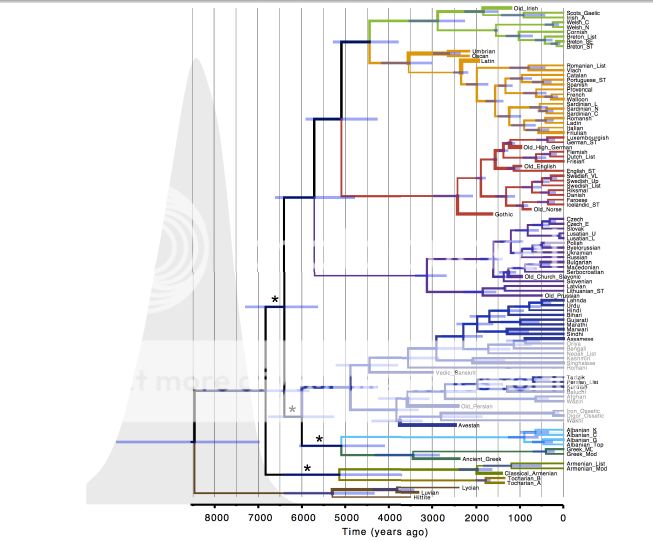That's an uninformed counter. There is absolutely no evidence that all languages originated in Mesopotamia in c. 2250 BC; indeed the linguistic evidence is flatly against it. As I pointed out, the article only concerns the Indo-European language family which just so happens to have originated geographically near the ANE. What about other language families which had their Urheimat nowhere near Mesopotamia? There are many in the Americas and Asia, as well as Africa. They also have similar time depth: the Austronesian family originated in Taiwan about 6,000 years ago. We know this from both archaeological evidence (pertaining to the migration of the Austronesian-speaking peoples into Taiwan and then into Indonesia and the Pacific) and linguistic evidence (the majority of Austronesian languages come from just one branch of Proto-Austronesian, all the other major early branches are Formosan languages, and the closest relatives of Austronesian are the Tai-Kadai languages in Southeast Asia). The situation is similar with the Indo-European languages. The cladistic analysis given in the new Science article has all non-Anatolian Indo-European languages branching off in a single branch (iirc the Proto-Indo-European laryngeals are preserved only by the Anatolian languages), the time depth required to connect the various branches together is about 8,000 years, and the migration of younger daughter families through Europe and South Asia point to an Urheimat in Anatolia (Turkey):


We can see that around 2250 BC, there were multiple Indo-European families already in existence, including multiple Anatolian languages. The earliest written evidence of Hittite (in the Akkadian texts from Kültepe) dates to around 1850 BC, and this was just one of many Anatolian languages. And this doesn't even count all the other languages that were attested before 2250 BC. In Mesopotamia itself, we have evidence of Akkadian (a Semitic language) as far back as 2600 BC (in the form of PNs) and Sumerian (a language isolate) as far back as 3100 BC. Outside of Mesopotamia, the earliest written evidence of Egyptian goes back to 3400 BC. Akkadian, moreover, was only a form of East Semitic and was a daughter language of a prior Proto-Semitic. A similar analysis for Proto-Semitic done in 2009 points to an origin around 3700 BC:

And Proto-Semitic was itself a daughter language within a larger Afro-Asiatic family; ancient Egyptian was itself a cousin. Dates for the breakup of Proto-Afro-Asiatic vary considerably because the evidence is less clear on account of the great time depth; estimates range between 16000 and 7500 BC, with most converging around a date c. 11000 BC. Then there is the unsettled question of whether Proto-Afro-Asiatic was itself part of a larger Nostratic language family (with Proto-Indo-European as a younger cousin of Proto-Afro-Asiatic). If such a language existed (and the question is controversial), then the date of Proto-Nostratic would take us back into the Pleistocene epoch.




